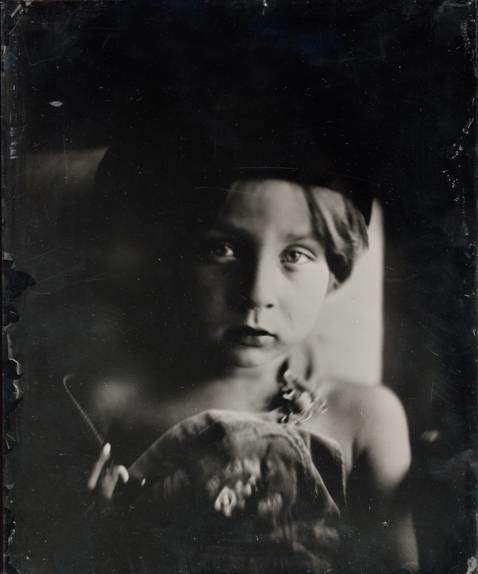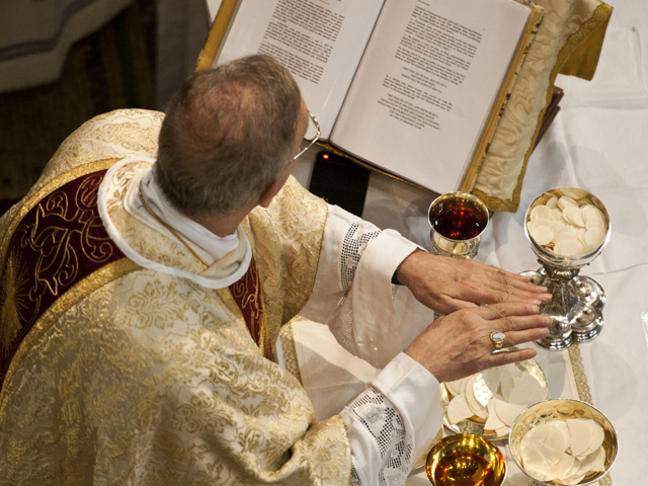Outside of my window there sits a lone Rose-breasted Grosbeak making the most beautiful music. It calls out in orchestral scales and subtle tones. And there is no reply. The great oak in which he sits has almost sprung into its leafy-green garb and the contrast of the little persistent bird arrayed in red, white, and black, against the high younger limbs of the old stand is quite stark. From my vantage looking up, I see both sorrow and joy, simultaneously.
I wonder if Christ calls to us in a similar way — gentle, persistent, seemingly small against the largeness of our everyday life?
There is a poem by Catholic convert, Jesuit priest, and poet, Fr. Gerard Manley Hopkins entitled, Spring and Fall to a Young Child. Most associate it with loss and death but really it is about our growing to see the hope that lies beyond death, and even the little deaths that fill our lives. And, like my backyard bird our daily tree may hold us for a while but it is not what we were created for. We were made to soar in the joy of the Heavenly Father’s garden.
If you’re a young man discerning a vocation, come and spend a little while with us and allow Christ to speak to you in the brief time we all are given to choose our salvation. And perhaps you too will find new richness in Fr. Hopkin’s poem, Spring and Fall, and the words that lie hidden between printed words.
Margaret, are you grieving
Over Goldengrove unleaving?
Leaves, like the things of man, you
With your fresh thoughts care for, can you?
Ah! as the heart grows older
It will come to such sights colder
By and by, nor spare a sigh
Though worlds of wanwood leafmeal lie;
And yet you will weep know why.
Now no matter, child, the name:
Sorrow’s springs are the same.
Nor mouth had, no nor mind, expressed
What heart heard of, ghost guessed:
It is the blight man was born for,
It is Margaret you mourn for.
Here’s Natalie Merchant’s fine musical folk version.
A small postscript: there is a surprisingly good commentary on Hopkin’s poem at http://www.sparknotes.com/poetry/hopkins/section4.rhtml
The title of the poem invites us to associate the young girl, Margaret, in her freshness, innocence, and directness of emotion, with the springtime. Hopkins’s choice of the American word “fall” rather than the British “autumn” is deliberate; it links the idea of autumnal decline or decay with the biblical Fall of man from grace. That primordial episode of loss initiated human mortality and suffering; in contrast, the life of a young child, as Hopkins suggests (and as so many poets have before him—particularly the Romantics), approximates the Edenic state of man before the Fall. Margaret lives in a state of harmony with nature that allows her to relate to her paradisal “Goldengrove” with the same sympathy she bears for human beings or, put more cynically, for “the things of man.”
Margaret experiences an emotional crisis when confronted with the fact of death and decay that the falling leaves represent. What interests the speaker about her grief is that it represents such a singular (and precious) phase in the development of a human being’s understanding about death and loss; only because Margaret has already reached a certain level of maturity can she feel sorrow at the onset of autumn. The speaker knows what she does not, namely, that as she grows older she will continue to experience this same grief, but with more self-consciousness about its real meaning (“you will weep, and know why”), and without the same mediating (and admittedly endearing) sympathy for inanimate objects (“nor spare a sigh, / Though worlds of wanwood leafmeal lie”). This eighth line is perhaps one of the most beautiful in all of Hopkins’s work: The word “worlds” suggests a devastation and decline that spreads without end, well beyond the bounds of the little “Goldengrove” that seems so vast and significant to a child’s perception. Loss is basic to the human experience, and it is absolute and all-consuming. “Wanwood” carries the suggestion of pallor and sickness in the word “wan,” and also provides a nice description of the fading colors of the earth as winter dormancy approaches. The word “leafmeal,” which Hopkins coined by analogy with “piecemeal,” expresses with poignancy the sense of wholesale havoc with which the sight of strewn fallen leaves might strike a naive and sensitive mind.
In the final, and heaviest, movement of the poem, Hopkins goes on to identify what this sorrow is that Margaret feels and will, he assures us, continue to feel, although in different ways. The statement in line 11 that “Sorrow’s springs are the same” suggests not only that all sorrows have the same source, but also that Margaret, who is associated with springtime, represents a stage all people go through in coming to understand mortality and loss. What is so remarkable about this stage is that while the “mouth” cannot say what the grief is for, nor the mind even articulate it silently, a kind of understanding nevertheless materializes. It is a whisper to the heart, something “guessed” at by the “ghost” or spirit—a purely intuitive notion of the fact that all grieving points back to the self: to one’s own suffering of losses, and ultimately to one’s own mortality.
Though the narrator’s tone toward the child is tender and sympathetic, he does not try to comfort her. Nor are his reflections really addressed to her because they are beyond her level of understanding. We suspect that the poet has at some point gone through the same ruminations that he now observes in Margaret; and that his once-intuitive grief then led to these more conscious reflections. Her way of confronting loss is emotional and vague; his is philosophical, poetical, and generalizing, and we see that this is his more mature—and “colder”—way of likewise mourning for his own mortality.




